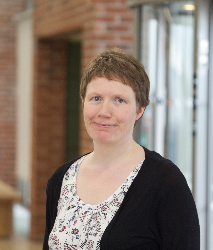AMR Q&A with Dr Jody Winter

Could you introduce yourself and tell us a little bit about your research?
My name is Dr Jody Winter, I’m a Principal Lecturer in Microbiology at Nottingham Trent University (NTU). My favourite bacterium is Helicobacter pylori and I’m especially interested in how this bug can mutate and change over time, forming diverse populations within individual human stomachs. This has implications for antimicrobial therapy because the H. pylori population infecting an individual will be a “moving target”!
Members of my research team are currently studying H. pylori diversity in AMR phenotypes and genotypes, novel antimicrobials to target H. pylori and other bacterial species, and the prevalence of AMR bacteria in local rivers.
What are some of the challenges we face with antimicrobial resistance?
The sheer complexity of the problem of AMR makes it challenging to address. It affects every sector including human, animal and environmental health. So engagement with a very wide range of stakeholders is necessary and AMR needs to be tackled globally, not just locally. It can also be a challenge to articulate exactly what the problem is, and how/why the solutions (such as reducing unnecessary use of antimicrobial drugs) work. We need really clear and accessible communication with all stakeholders including the general public, in all parts of the world.
Could you tell us about how you collaborate with other scientists/stakeholders/members of the public in your work?
I’m part of the long-standing partnership between NTU and Makerere University, Uganda led by Dr David Musoke and Prof Linda Gibson. Together with partners from Buckinghamshire Healthcare NHS Trust and Entebbe Regional Referral Hospital, we’re working on a Commonwealth Partnerships for Antimicrobial Stewardship (CwPAMS) project to establish a Centre of Excellence for antimicrobial stewardship in Central Uganda. This involves us working together as a multidisciplinary and international team of academic and clinical microbiologists, pharmacists, veterinary, environmental and public health experts. Our activities have so far included research to understand the current situation and challenges in antimicrobial stewardship in Uganda, training events for university students and healthcare professionals, establishing a mentorship scheme for healthcare facilities, and of course monitoring the impact of the project for continuous improvement.
I’ve learnt so much from the different perspectives of the various stakeholders in the project and had the opportunity to travel internationally and improve my understanding about AMR, and the challenges in tackling it in the real world.
Why is it important to get involved with societies like us when tackling big problems like antimicrobial resistance?
Professional societies like the Microbiology Society play a crucial role in supporting researchers to network with each other, and to engage beyond their usual networks with non-academic stakeholders and with the public who are impacted by our work. The Microbiology Society supports us with professional development opportunities, resources we can use in our communications and, of course, grant funding and avenues for publishing our work to a wide audience. The Society can use its platform to amplify the voices of its members as we work together on big problems like AMR.
What advice would you give an early career microbiologist wanting to work on solutions to the antimicrobial resistance crisis?
Don’t hesitate - just jump in and get involved! It is a fast-moving field but don’t feel daunted or worry that you are not knowledgeable enough. If you have a passion for your subject and a willingness to learn, you can develop your skills and knowledge along the way. Working on such an important problem is enormously rewarding. It is also a very complex and formidable problem, so we need as many early career scientists with diverse backgrounds, skill sets and perspectives to get involved as possible.
Image: iStock/Inventori
